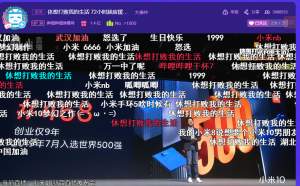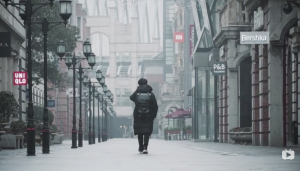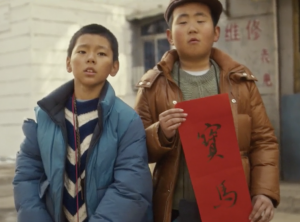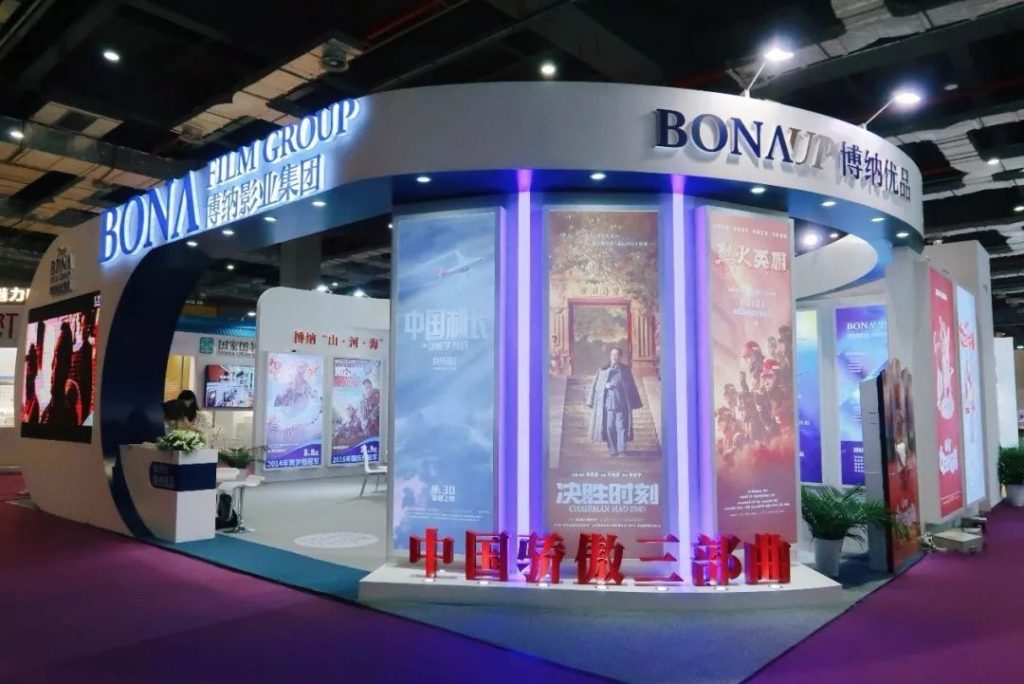
Major studios such as Bona Film Group are paying more attention to brands
China’s October 1 National Day holiday, commemorating the founding of the People’s Republic of China in 1949, is always an important political occasion. This year’s 70th anniversary was especially momentous as it was the first major one under Xi Jinping. (2009 was the last year celebrations were held on a comparable scale.)
The run-up to the holiday offered brands a critical opportunity to curry official favor through patriotic marketing activities, from Tencent’s “Homeland Dream” game and Douyin’s “Heart China” challenge to limited-edition luxury goods and numerous branded films wishing the nation a happy birthday.
In the entertainment sector, the anniversary provided a safe space for brands to forge links with a slew of patriotic films guaranteed to draw moviegoers, either on their own merits — thanks to a lack of competition from other titles during the weeklong holiday — or via tickets giveaways by companies and government bodies. China’s box office has suffered this year due to political sensitivities that have seen a number of planned releases shelved indefinitely, most notably the big-budget war epic “The Eight Hundred,” which had its Shanghai International Film Festival premiere canceled at the last minute.
Brands looking for product placement deals and other types of entertainment-related brand integrations have found it more predictable (and profitable) to shift their focus to areas such as television, video-streaming and short video. Though none of these sectors are free from restrictions, they generally draw less regulatory scrutiny and have a bit more freedom than the high-profile movie business. But even for television, the marching orders in the run-up to the 70th anniversary of the founding of the PRC on October 1 were clear: emphasize patriotic content, and the rest can wait. Brands followed suit, creating extensive marketing campaigns to align themselves with the official narratives of China’s rise and development over the past 70 years.
To mark the 70th anniversary of the founding of the People’s Republic, Chinese studios tapped leading directors and celebrities to offer cinematic “gifts” with nationalistic themes, in a genre known as the “main melody” (zhuxuanlu 主旋律). Three of these movies were selected to take over Chinese theaters on the eve of the holiday and dominated the box office during the week that followed, while others were slated for release in the weeks before and after. Given the political security of these films, brands could rest assured that they would be released on schedule and attract large numbers of moviegoers, so demand was high among (mostly Chinese) brands to forge associations with this type of content.
Below we look at brand involvement in the three major hits of the holiday period — each of which adopted a slightly different strategy in regards to its relationships with brands.
The Record-Setter: “The Captain”
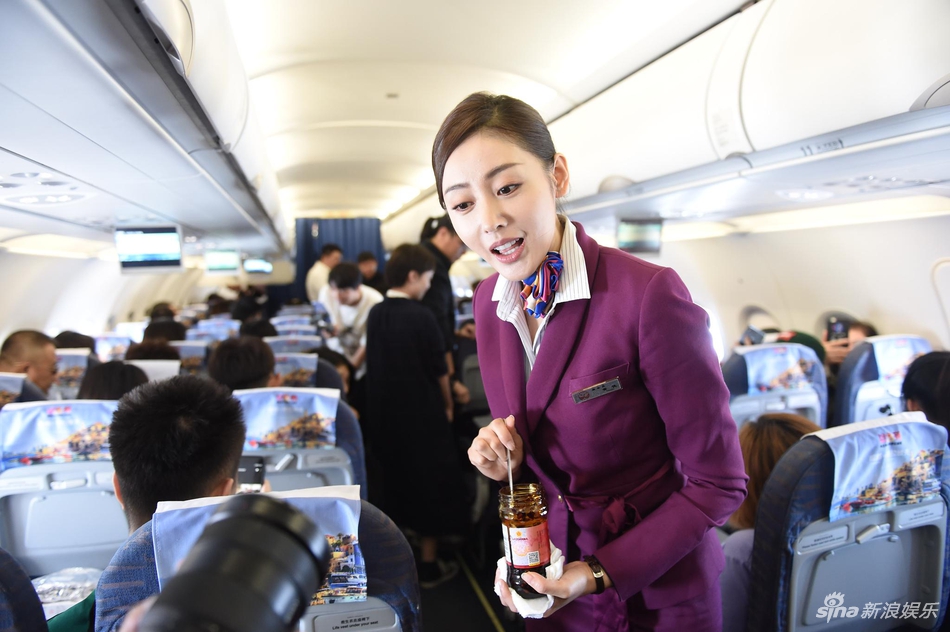
Laoganma chili sauce received a boost from its presence at the “10,000-meter” movie premiere for “The Captain”
Standing out for its ties to brands is Bona Film Group’s “The Captain” (中国机长) based on the true story of a disaster averted after the windshield of a Sichuan Airlines plane blew out at 32,000 feet. The film racked up a reported 220 brand partners, a record for a Chinese production. This was made possible in part by Bona’s debut participation in the 2019 Licensing Expo China to promote its newly created division for collaborations, Bona UP.
Admittedly, most of the brands associated with “The Captain” engaged in inexpensive “tag-along” marketing activities, such as putting their names on otherwise identical film posters or promoting the film through their official social media accounts. Others, however, had products featured in the film and further extended the connection with additional marketing activities.
As the carrier involved in the near-disaster that formed the basis for the film, Sichuan Airlines had a prominent organic placement in the film, although perhaps not an ideal circumstance given that the story revolves around an aircraft malfunction. The airline boosted its role by hosting a much-discussed “10,000 meter” movie premiere on the first leg of the very same route featured in the film, complete with cast members dressed in character. Kingston Technology, a U.S.-based computer-memory firm, sponsored the event and provided passengers with special gift boxes containing a commemorative flash drive and flight badge made in partnership with Bona UP . Famed chili sauce brand Laoganma also received a boost in publicity when one of the stars, who played a flight attendant in the film, was photographed offering Laoganma products to passengers.
Other brands with major placement in the film included:
- Breitling watches, inspired by images of real-life pilot Liu Chuanjian wearing the brand’s Chronoliner watch, a longtime favorite of airline captains around the world.
- Great Wall Motors, which supplied its luxury Wey SUV line for the production.
- Huawei Honor mobile phones, which leveraged the recent surge in the popularity of its celebrity ambassador Li Xian, who plays an air traffic controller in the film.
National Names: “My People, My Country”
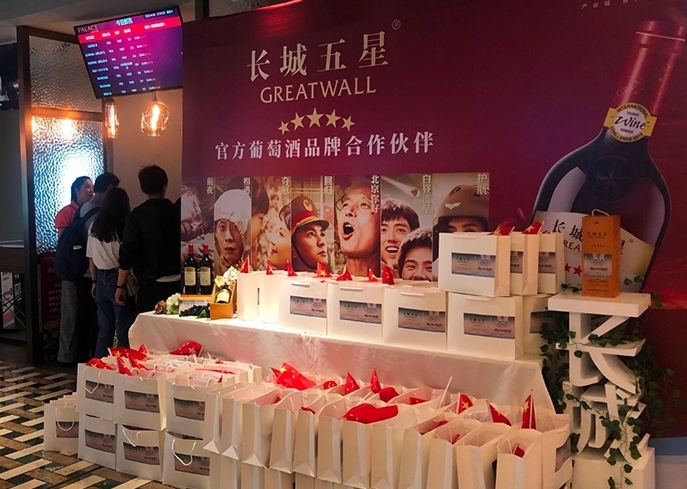
A Great Wall Wine viewing party for “My People, My Country”
Brand cooperation with “My People, My Country” (我和我的祖国) was more tightly focused on major domestic enterprises, such as SAIC Volkswagen (one of China’s earliest automotive joint ventures, established in 1984), China UnionPay, Yili Dairy, Lenovo, Great Wall Wine, and upscale tea producer Xiao Guan Cha. These brands were able to position themselves as playing a role in China’s development, which mirrors the film’s use of different directors to depict key moments in China’s rise over the past seven decades. Many of their collaborative marketing activities played up the associations between the brands and on-screen events:
- Great Wall Wine hosted viewing parties across the country and emphasized its role in supporting China’s Olympic ambitions and its space program.
- Lenovo designed a line of colorful notebook computers with the film’s title and imagery on the top covers, with corresponding themed decor in its shops to enhance its promotion of the film.
- Xiao Guan Cha played up the unity of the Chinese nation with its round gift boxes of assorted teas, including one box with 56 containers, each representing one of China’s officially recognized ethnic groups.
- Yili Dairy designed special milk cartoons tied to the film’s storyline. (See this week’s case study for more on Yili’s partnership).
- China UnionPay is the official payment partner for the film, and created a popular campaign celebrating the Chinese people. (See this week’s video pick for more.)
Licensing Savvy: “The Climbers”

Teddy Bear Collection’s collaboration with “The Climbers”
Everest adventure film “The Climbers” (攀登者) is set in the years 1960 and 1975, when branding essentially did not exist in China. However, Shanghai Film Group still established successful brand relationships through the licensing of derivatives. Its producers reportedly developed an IP licensing strategy well in advance of the film’s release on September 30, thus avoiding the mistakes made in the production of two major Chinese blockbusters from earlier this year, “The Wandering Earth” and “Nezha,” which failed to tap the revenue potential of derivatives licensing to the fullest. Among the creative licensing initiatives were the following;
- Tapping into the current “meng” (萌, cute) cultural trend, Lego-like toy maker Loz created miniature block characters based on the film, while Chinese toy brand Skynet launched mystery boxes with its Teddy Bear Collection figures dressed as climbers.
- Personal care brand Soocas created commemorative gift boxes for its electric shavers and “Climbers” athletic socks.
- Bright Dairy developed limited-edition “White Bear Ice Cream” products branded with imagery from “The Climbers” and offered movie ticket discounts with purchases.
- Tmall worked with sportswear brand Toread, the film’s exclusive outdoor gear partner, on an inspirational campaign designed to fuel interest in mountaineering and encourage people to spend time outside during the holiday.
- Netease used its popular “Day After Tomorrow” and “Minecraft” titles to allow players to virtually experience the challenges of climbing Everest.



